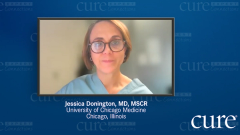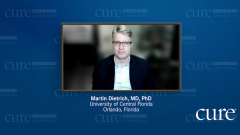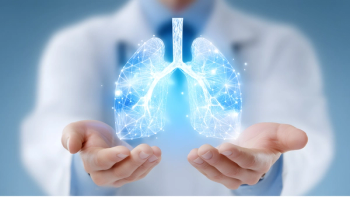
The Role of the Patient in Early Non-Small Cell Lung Cancer Adjuvant Therapy Selection
An expert surgeon explains the role patients have in adjuvant therapy selection for early non-small cell lung cancer.
Episodes in this series

Jessica Donington, M.D., M.S.C.R.: Having a strong relationship with your medical oncologist is important. This is the person who’s going to treat you for quite a while and potentially follow you for the rest of your life. It should be someone you trust and have faith in. And if that relationship is not there, a second opinion can go a long way. Lung cancer is complicated, it’s always worth a second opinion. As a patient, the other thing you have to request, you don’t get to pick your medications necessarily. Picking which 2 chemotherapies are going to be paired for you and which are best is sophisticated stuff. But as a patient, you should be making sure, and you should be asking about molecular testing. Before anyone prescribes you adjuvant therapy, you must be asking, has my tumor been sent for molecular analysis? Again, it doesn’t necessarily change the first step in therapy, but it can determine whether there is a second type of therapy. And that’s what patients should be doing and advocating for themselves in terms of their own future. It’s important for patients to recognize, similar to surgery, that chemotherapy comes with adverse events. It comes with some toxicity and the importance of eating well, sleeping well and exercising during those therapies, that kind of stuff is essential prior to surgery. It’s also essential when you’re undergoing adjuvant chemotherapy or adjuvant immunotherapy or targeted therapy. Keeping your health as good as possible goes a long way in your ability to tolerate those medicines. The other thing that everybody needs to do is anybody who is smoking should stop smoking. There’s no doubt about it, that we know that overall survival is poorly impacted by patients who continue to smoke past a lung cancer diagnosis. Again, any of my patients who have smoked up to surgery, I beg, plead and do anything I can to make sure that they understand that this is truly an incredibly important time for them to stop smoking. And it will make your adjuvant therapy much easier. I would never want to give adjuvant therapy to a patient personally. There are surgeons who talk about, especially with the ADAURA trial and the fact that osimertinib [Tagrisso®] is a pill, maybe we should just prescribe this ourselves, do we need those medical oncologists? And I’m always like, yes, because it is complicated now, not only in terms of picking the right medicine for the right patient, but for looking for the right symptoms while you’re prescribing. Each of the medicines carries their own little group of toxicities that medical oncologists are totally clued into. They know exactly what to be looking for with each of these classes of medicines. And therefore, the medical oncologist is actually more important than ever. And teamwork here means more than anything because this isn’t easy anymore. And the difference between complications we see with targeted therapies versus complications we see with cancer immunotherapies and standard chemotherapy are entirely different. And I even refer some of my early-stage patients to medical oncologists. My patients who have aggressive looking tumors, they might start that conversation, even if they’re not candidates for chemotherapy right away after surgery. I’m worried about their recurrence. And we think a little bit outside the box of, do they need to have this conversation for the risks that they could recur or because there may be a trial that makes them a candidate?
Transcript edited for clarity.






